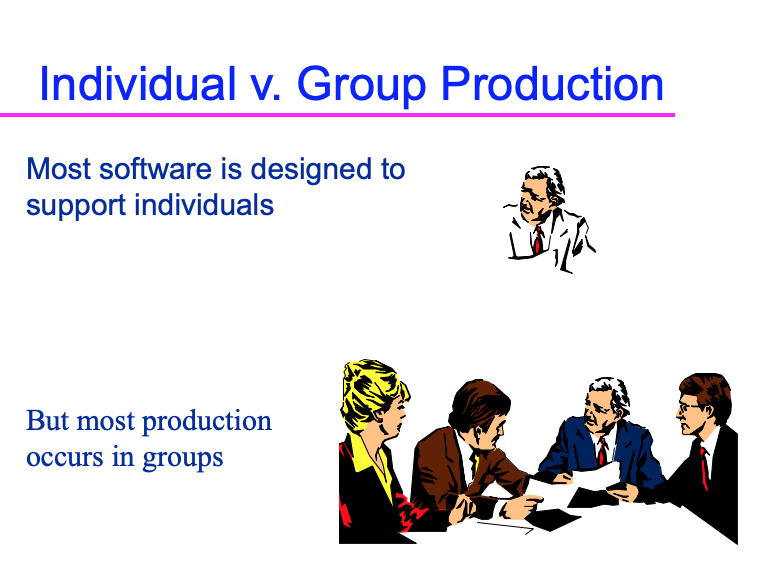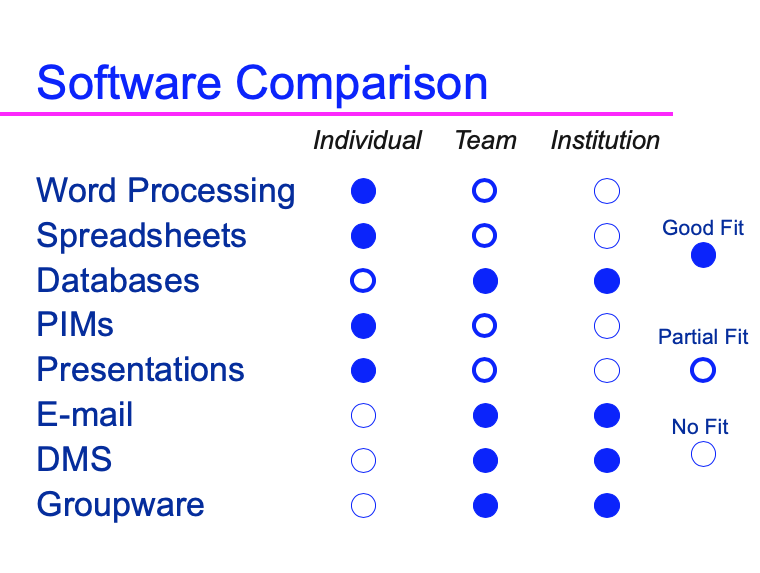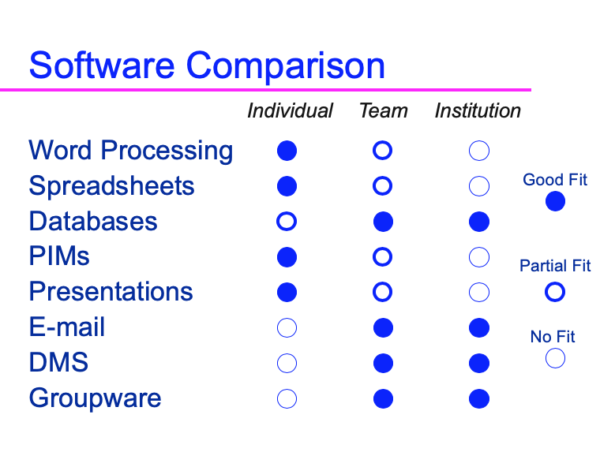Collaboration improves problem-solving, productivity, and innovation. In normal times, lawyers and legal professionals collaborate in-person. With work from home (WFH) during the COVID epidemic, video conferences have replaced in-person meetings.
The WFH video experience prompts a collaboration question. Beyond in-person or video meetings, how effectively do legal professionals collaborate. How well do they work in groups? And can we do better?
To answer this question, let’s look at how others professionals work. Across industries, many use purpose-built software to coordinate within and across groups, to solve problems together, and to collaborate. Legal professionals, in contrast, use software mainly to pass-the-baton, not work in teams. Lawyers largely continue to rely on 1990s software designed to support individual work, with few features for group work or real-time collaboration.
I noted these distinctions in a 1997 a presentation. The first slide below sets up the distinction, the second categorizes the then-prevalent categories of software:


PIMS : Personal Information Manager || DMS: Document Management System
My views have changed since then. Categorizing email as team software was and remains wrong: have fun trying to parse a long email thread with multiple participants and multiple subjects. And while document management software supports group work, it’s more about sharing documents and sequential collaboration and less about real-time and dynamic collaboration.
Lawyers today spend most of their time in MS Word, Outlook, and a browser. Contrast that with widely-used – outside of legal – 21st century software designed specifically to support groups:
- Multi-person chat (e.g., AIM, Slack, MS Teams, or Google Hangouts)
- Group screen share and video (e.g., Zoom or Google Hangouts)
- Shared task management (e.g., ToDoist, DoneDone, BaseCamp, Trello, or Asana)
- Joint authoring (e.g. Google Documents).
And consider three recent surveys asking about a range of legal technology. None of the dozens of software products listed is designed specifically to collaborate:
- ILTA’s 2019 Technology Survey (executive summary) covers one dozen applications in one question.
- The 2019 Aderant Business of Law and Legal Technology Survey asks about 18 types of software.
- The CLOC 2019 State of the Industry asks about two dozen types of software.
Our abrupt move to WFH caused many legal professions to learn video conferencing and e-signing software. And those previously wed to paper now get by with way less. But beyond that, how much has the way lawyers work changed? Does the COVID crisis create a new mindset that allows a rethink, a path to using collaboration software? And if we do not rethink how we work, that implies we believe how we work today is just fine.
In my view, legal leaders should consider whether to support and encourage their organizations to adopt new ways of collaborating and working together in real time. We have an opportunity to move toward more, and more effective, collaboration with purpose-built technology for groups and real-time collaboration. Examples include products like MS Teams or Slack and the entire category of transaction management platforms.
Maybe such a move is too big a burden. Maybe it will face resistance. But now is the ideal time: minds may be more open now than in the past. And I believe the firms that take advantage of this crisis to improve the how of work will thrive post-crisis.
—
NOTES: A version of this post originally appeared at Legal IT Insider on 14 April 2020. I started thinking about new ways of working early in the lockdowns; see my March 2020 post, Rethinking How Lawyers Work Post Crisis.
Archives
Blog Categories
- Alternative Legal Provider (44)
- Artificial Intelligence (AI) (57)
- Bar Regulation (13)
- Best Practices (39)
- Big Data and Data Science (14)
- Blockchain (10)
- Bloomberg Biz of Law Summit – Live (6)
- Business Intelligence (21)
- Contract Management (21)
- Cool Legal Conferences (13)
- COVID-19 (11)
- Design (5)
- Do Less Law (40)
- eDiscovery and Litigation Support (165)
- Experience Management (12)
- Extranets (11)
- General (194)
- Innovation and Change Management (188)
- Interesting Technology (105)
- Knowledge Management (229)
- Law Department Management (20)
- Law Departments / Client Service (120)
- Law Factory v. Bet the Farm (30)
- Law Firm Service Delivery (128)
- Law Firm Staffing (27)
- Law Libraries (6)
- Legal market survey featured (6)
- Legal Process Improvement (27)
- Legal Project Management (26)
- Legal Secretaries – Their Future (17)
- Legal Tech Start-Ups (18)
- Litigation Finance (5)
- Low Cost Law Firm Centers (22)
- Management and Technology (179)
- Notices re this Blog (10)
- Online Legal Services (64)
- Outsourcing (141)
- Personal Productivity (40)
- Roundup (58)
- Structure of Legal Business (2)
- Supplier News (13)
- Visual Intelligence (14)

